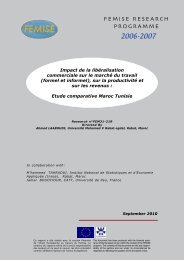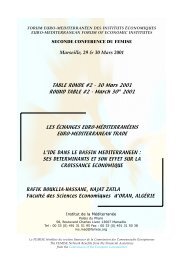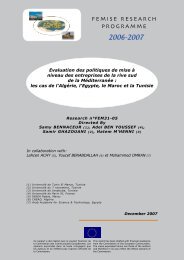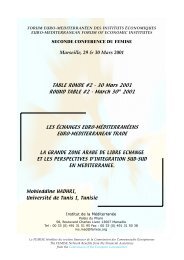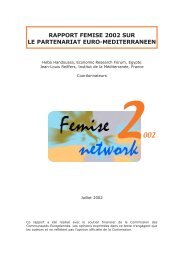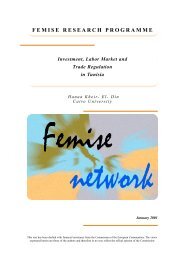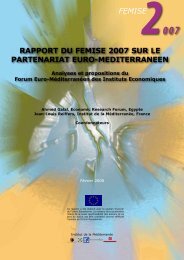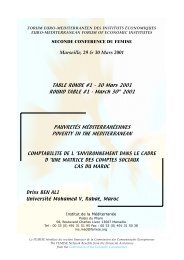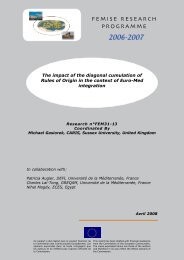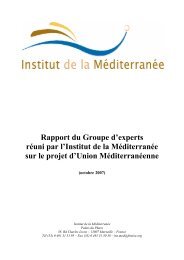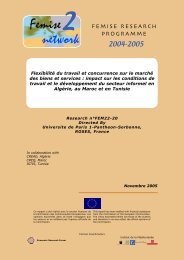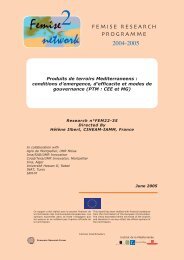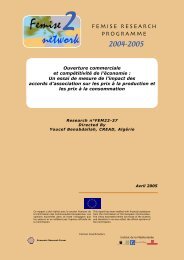PDF, GB, 139 p., 796 Ko - Femise
PDF, GB, 139 p., 796 Ko - Femise
PDF, GB, 139 p., 796 Ko - Femise
Create successful ePaper yourself
Turn your PDF publications into a flip-book with our unique Google optimized e-Paper software.
of 1998, the Ministry of Industry Trade and Labour has been working for the phasing out of<br />
many official standards aimed at preventing imports. Some 250 of 540 official standards were<br />
dropped, among them marks for the length of simple matches and a standard to determine a<br />
minimal number of ventilator speeds (Brezis, 1999). More generally, the Israeli government<br />
has been moving over time in the direction of bringing its standards into line with<br />
international ones and completely abolishing some anachronistic local standards. Currently,<br />
one quarter of the mandatory standards emulate international standards.<br />
Protectionism via the use of government procurement has plagued the Israeli economy since<br />
Independence in 1948, as the State and its agencies have played a dominating role in<br />
developing the economy in the first 40 years after independence and in defending its citizens<br />
since this very day. In other words, public expenditure is unusually high for an OECD-type<br />
economy, with the Army and the Ministry of Defence playing a central role. A clear sign of<br />
protectionist intent in that respect is that while Israel has been for years party to the<br />
plurilateral Agreement on Government Procurement (GPA), it has always invoked<br />
developing-country status, allowing it to implement offset arrangements. For instance, the<br />
decision adopted by the Committee on Government Procurement in December 2004 allows<br />
Israel to require offsets for up to 20% of a contract. Government agencies and state-owned<br />
companies are required even today to follow an offset policy, designed to promote national<br />
manufactures (Mandatory Tenders Regulation (Preference for Israeli Products and Mandatory<br />
Business Cooperation) of 1995). All international public tenders with a value of US$ 0.5<br />
million or above must include a clause on "industrial cooperation" (IC) with Israeli entities in<br />
the amount of at least 35% (30% in tenders covered by the GPA) of the value of the contract.<br />
To satisfy the IC offset requirement, a foreign supplier can subcontract to local companies,<br />
invest in local industries, undertake a know-how transfer, or acquire goods made in Israel or<br />
from work or services performed in Israel.<br />
Foreign governments, particularly the one of the US, have been complaining for years, about<br />
the lack of transparency in Israeli practices. For instance there is the problem of the language.<br />
Officially, only for tenders under the GPA, the information must be published in an English<br />
newspaper (either the Jerusalem Post or the International Herald Tribune-Ha'aretz). Even so,<br />
the USTR has been claiming of lack of transparency and lengthy procedures, as well as<br />
arbitrary awards of contracts. For example, although some Israeli government entities make a<br />
93



